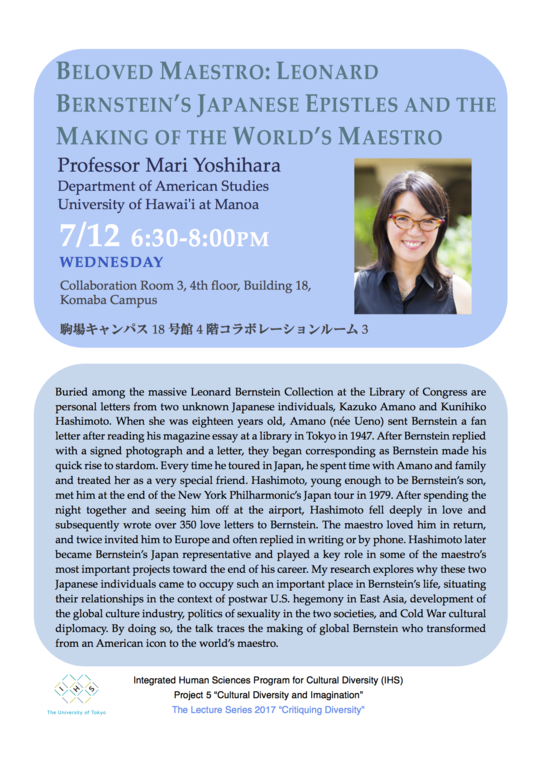
プロジェクト5 2017年度 “Critiquing Diversity” 講演会シリーズ 吉原真里先生講演会 “Beloved Maestro: Bernstein’s Japanese Epistles and the Making of the World’s Maestro” のお知らせ
- 日時
- 2017年7月12日(水)18:30 - 20:00
- 場所
- 東京大学駒場キャンパス18号館コラボレーションルーム3
- 講演者
- 吉原真里(ハワイ大学アメリカ研究学部教授)
- 使用言語
- 英語
- 備考
- 入場無料・事前登録不要
- 主催
- 東京大学大学院博士課程教育リーディングプログラム「多文化共生・統合人間学プログラム(IHS)」教育プロジェクト5「多文化共生と想像力」
プロジェクト5「多文化共生と想像力」では、7月12日に2017年度“Critiquing Diversity”講演会シリーズの第一回といたしまして、ハワイ大学アメリカ研究学部教授吉原真里先生をお招きし、講演会を開催いたします。レナード・バーンスタインと日本との交流、またジェンダーの観点から多文化共生社会の可能性について、お話しいただきます。皆様の積極的な参加をお待ちしています。
講演要旨
Buried among the massive Leonard Bernstein Collection at the Library of Congress are personal letters from two unknown Japanese individuals, Kazuko Amano and Kunihiko Hashimoto. When she was eighteen years old, Amano (née Ueno) sent Bernstein a fan letter after reading his magazine essay at a library in Tokyo in 1947. After Bernstein replied with a signed photograph and a letter, they began corresponding as Bernstein made his quick rise to stardom. Every time he toured in Japan, he spent time with Amano and family and treated her as a very special friend. Hashimoto, young enough to be Bernstein’s son, met him at the end of the New York Philharmonic’s Japan tour in 1979. After spending the night together and seeing him off at the airport, Hashimoto fell deeply in love and subsequently wrote over 350 love letters to Bernstein. The maestro loved him in return, and twice invited him to Europe and often replied in writing or by phone. Hashimoto later became Bernstein’s Japan representative and played a key role in some of the maestro’s most important projects toward the end of his career. My research explores why these two Japanese individuals came to occupy such an important place in Bernstein’s life, situating their relationships in the context of postwar U.S. hegemony in East Asia, development of the global culture industry, politics of sexuality in the two societies, and Cold War cultural diplomacy. By doing so, the talk traces the making of global Bernstein who transformed from an American icon to the world’s maestro.
講演者ご紹介
吉原真里(ハワイ大学教授、アメリカ研究)
主な著作:
- 『「アジア人」はいかにしてクラシック音楽家になったのか?──人種・ジェンダー・文化資本』(アルテスパブリッシング、2013年)
- 『ヴァン・クライバーン国際ピアノ・コンクール──市民が育む芸術イヴェント 』(アルテスパブリッシング、2010年) (矢口祐人と共編著)
- 『現代アメリカのキーワード』(中公新書、2006年)
- Embracing the East: White Women and American Orientalism (Oxford University Press, 2003)
注意事項
- プログラム生には、参加後、報告書を提出していただきます。
- 写真・映像・音声等を記録することとその記録されたものをプログラム活動で使用する可能性があることをご了承いただいた上でご参加ください。


